Deck 12: Amines
Question
Question
Question
Question
Question
Question
Question
Question
Question
Question
Question
Question
Question
Question
Question
Question
Question
Question
Question
Question
Question
Question
Question
Question
Question
Question
Question
Question
Question
Question
Question

Unlock Deck
Sign up to unlock the cards in this deck!
Unlock Deck
Unlock Deck
1/31
Play
Full screen (f)
Deck 12: Amines
1
Instructions: Classify each of the nitrogen atoms in the compound shown below as primary, secondary, tertiary, or quaternary.
Classify:
Classify:

The nitrogen in mepiquat chloride is a quaternary ammonium salt.
2
Instructions: Consider the reaction below to answer the following question(s).
Methamphetamine can be synthesized by reacting phenyl-2-propanone with methylamine in the presence of H2/Ni. Refer to instructions. Identify the nucleophile in the initial reaction of phenyl-2-propanone to yield intermediate A and classify the type of reaction that produces the final product from
Refer to instructions. Identify the nucleophile in the initial reaction of phenyl-2-propanone to yield intermediate A and classify the type of reaction that produces the final product from
A.
Methamphetamine can be synthesized by reacting phenyl-2-propanone with methylamine in the presence of H2/Ni.
 Refer to instructions. Identify the nucleophile in the initial reaction of phenyl-2-propanone to yield intermediate A and classify the type of reaction that produces the final product from
Refer to instructions. Identify the nucleophile in the initial reaction of phenyl-2-propanone to yield intermediate A and classify the type of reaction that produces the final product from A.
The nucleophile is methylamine and the final (second) reaction is a reduction.
3
Instructions: Consider the reaction below to answer the following question(s).
Methamphetamine can be synthesized by reacting phenyl-2-propanone with methylamine in the presence of H2/Ni. Refer to instructions. The synthesis of methamphetamine by reaction of 2-phenyl-2 propanone with methylamine in the presence of H2/Ni is referred to as:
Refer to instructions. The synthesis of methamphetamine by reaction of 2-phenyl-2 propanone with methylamine in the presence of H2/Ni is referred to as:

Methamphetamine can be synthesized by reacting phenyl-2-propanone with methylamine in the presence of H2/Ni.
 Refer to instructions. The synthesis of methamphetamine by reaction of 2-phenyl-2 propanone with methylamine in the presence of H2/Ni is referred to as:
Refer to instructions. The synthesis of methamphetamine by reaction of 2-phenyl-2 propanone with methylamine in the presence of H2/Ni is referred to as:
c.
4
Instructions: Classify each of the nitrogen atoms in the compound shown below as primary, secondary, tertiary, or quaternary.
Classify:
Classify:


Unlock Deck
Unlock for access to all 31 flashcards in this deck.
Unlock Deck
k this deck
5
Instructions: Draw structures corresponding to each of the IUPAC names given in the following question(s).
Draw:
Draw:

Unlock Deck
Unlock for access to all 31 flashcards in this deck.
Unlock Deck
k this deck
6
Instructions: Based on the following structures, name the compound.
Name:
Name:


Unlock Deck
Unlock for access to all 31 flashcards in this deck.
Unlock Deck
k this deck
7
Instructions: Consider the reaction below to answer the following question(s).
Methamphetamine can be synthesized by reacting phenyl-2-propanone with methylamine in the presence of H2/Ni. Refer to instructions. Although the yield of methamphetamine is good, some unreacted phenyl-2-propanone remains after the reaction is complete. Describe how methamphetamine can be separated from phenyl-2-propanone.
Refer to instructions. Although the yield of methamphetamine is good, some unreacted phenyl-2-propanone remains after the reaction is complete. Describe how methamphetamine can be separated from phenyl-2-propanone.
Methamphetamine can be synthesized by reacting phenyl-2-propanone with methylamine in the presence of H2/Ni.
 Refer to instructions. Although the yield of methamphetamine is good, some unreacted phenyl-2-propanone remains after the reaction is complete. Describe how methamphetamine can be separated from phenyl-2-propanone.
Refer to instructions. Although the yield of methamphetamine is good, some unreacted phenyl-2-propanone remains after the reaction is complete. Describe how methamphetamine can be separated from phenyl-2-propanone.
Unlock Deck
Unlock for access to all 31 flashcards in this deck.
Unlock Deck
k this deck
8
Instructions: Based on the following structures, name the compound.
Name:
Name:


Unlock Deck
Unlock for access to all 31 flashcards in this deck.
Unlock Deck
k this deck
9
Instructions: Classify each of the nitrogen atoms in the compound shown below as primary, secondary, tertiary, or quaternary.
Classify: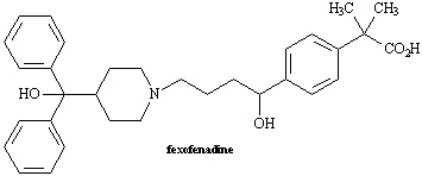
Classify:


Unlock Deck
Unlock for access to all 31 flashcards in this deck.
Unlock Deck
k this deck
10
In the following series of compounds, which is the most basic and the least basic? Explain your choices. 


Unlock Deck
Unlock for access to all 31 flashcards in this deck.
Unlock Deck
k this deck
11
Instructions: Based on the following structures, name the compound.
Name:
Name:


Unlock Deck
Unlock for access to all 31 flashcards in this deck.
Unlock Deck
k this deck
12
Instructions: Consider the reaction below to answer the following question(s). Methamphetamine can be synthesized by reacting phenyl-2-propanone with methylamine in the presence of H2/Ni.  Refer to instructions. Intermediate A is an example of:
Refer to instructions. Intermediate A is an example of:
A) an imine
B) an enamine
C) an iminium ion
D) an imide
 Refer to instructions. Intermediate A is an example of:
Refer to instructions. Intermediate A is an example of:A) an imine
B) an enamine
C) an iminium ion
D) an imide

Unlock Deck
Unlock for access to all 31 flashcards in this deck.
Unlock Deck
k this deck
13
Instructions: Give the major organic product(s) of each of the following reaction or sequence of reactions. Show all relevant stereochemistry.
Give major product(s):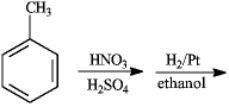
Give major product(s):


Unlock Deck
Unlock for access to all 31 flashcards in this deck.
Unlock Deck
k this deck
14
Rank the following compounds in order of increasing basicity. Label the least basic compound "1" and the most basic compound "4". Place the number corresponding to the compound's rank in the blank below the compound. 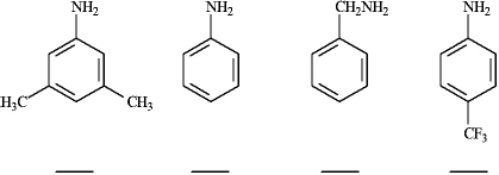


Unlock Deck
Unlock for access to all 31 flashcards in this deck.
Unlock Deck
k this deck
15
Instructions: Give the major organic product(s) of each of the following reaction or sequence of reactions. Show all relevant stereochemistry.
Give major product(s):
Give major product(s):


Unlock Deck
Unlock for access to all 31 flashcards in this deck.
Unlock Deck
k this deck
16
Instructions: Draw structures corresponding to each of the IUPAC names given in the following question(s).
Draw:
hexane-1,6-diamine
Draw:
hexane-1,6-diamine

Unlock Deck
Unlock for access to all 31 flashcards in this deck.
Unlock Deck
k this deck
17
Instructions: Draw structures corresponding to each of the IUPAC names given in the following question(s).
Draw:
N,N-dimethylcyclopentylamine
Draw:
N,N-dimethylcyclopentylamine

Unlock Deck
Unlock for access to all 31 flashcards in this deck.
Unlock Deck
k this deck
18
Circle any of the following that would be classified as a heterocyclic amine. 


Unlock Deck
Unlock for access to all 31 flashcards in this deck.
Unlock Deck
k this deck
19
Instructions: Give the major organic product(s) of each of the following reaction or sequence of reactions. Show all relevant stereochemistry.
Give major product(s):
Give major product(s):


Unlock Deck
Unlock for access to all 31 flashcards in this deck.
Unlock Deck
k this deck
20
Instructions: Based on the following structures, name the compound.
Name:
Name:


Unlock Deck
Unlock for access to all 31 flashcards in this deck.
Unlock Deck
k this deck
21
Which of the following compounds are tertiary (3 ) amines? 1.
2.
3.
4.
A) 1 and 2
B) 1 and 3
C) 1, 2 and 3
D) 1, 2, 3 and 4
2.
3.
4.
A) 1 and 2
B) 1 and 3
C) 1, 2 and 3
D) 1, 2, 3 and 4

Unlock Deck
Unlock for access to all 31 flashcards in this deck.
Unlock Deck
k this deck
22
Instructions: Give the major organic product(s) of each of the following reaction or sequence of reactions. Show all relevant stereochemistry.
Give the major product(s).
Give the major product(s).


Unlock Deck
Unlock for access to all 31 flashcards in this deck.
Unlock Deck
k this deck
23
Show how each of the following transformations might be best accomplished. More than one step may be required. Show all reagents and all intermediate structures.
Refer to instructions.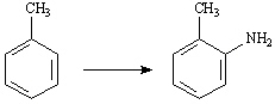
Refer to instructions.


Unlock Deck
Unlock for access to all 31 flashcards in this deck.
Unlock Deck
k this deck
24
Show how each of the following transformations might be best accomplished. More than one step may be required. Show all reagents and all intermediate structures.
Refer to instructions.
Refer to instructions.


Unlock Deck
Unlock for access to all 31 flashcards in this deck.
Unlock Deck
k this deck
25
Which of the following compounds are primary (1 ) amines? 
A) 1 and 2
B) 1 and 3
C) 1, 2 and 3
D) 1, 2, 3 and 4

A) 1 and 2
B) 1 and 3
C) 1, 2 and 3
D) 1, 2, 3 and 4

Unlock Deck
Unlock for access to all 31 flashcards in this deck.
Unlock Deck
k this deck
26
Show how each of the following transformations might be best accomplished. More than one step may be required. Show all reagents and all intermediate structures.
Refer to instructions.
Refer to instructions.


Unlock Deck
Unlock for access to all 31 flashcards in this deck.
Unlock Deck
k this deck
27
Predict the major organic product obtained from the following sequence of reactions. 


Unlock Deck
Unlock for access to all 31 flashcards in this deck.
Unlock Deck
k this deck
28
Instructions: Give the major organic product(s) of each of the following reaction or sequence of reactions. Show all relevant stereochemistry.
Give major product(s):
Give major product(s):


Unlock Deck
Unlock for access to all 31 flashcards in this deck.
Unlock Deck
k this deck
29
What is the major organic product obtained from the following reaction? 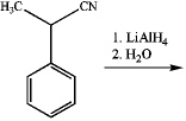
A)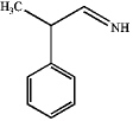
B)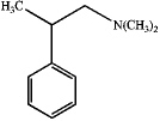
C)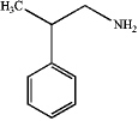
D)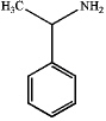

A)

B)

C)

D)


Unlock Deck
Unlock for access to all 31 flashcards in this deck.
Unlock Deck
k this deck
30
What is the major organic product obtained from the following reaction? 
A)
B)
C)
D)

A)

B)

C)

D)


Unlock Deck
Unlock for access to all 31 flashcards in this deck.
Unlock Deck
k this deck
31
What is the IUPAC name of the following compound? 
A) (R)-4-amino-2-methylhexane
B) (S)-4-amino-2-methylhexane
C) N-ethyl N-(3-methylpropyl) amine
D) (R)-3-amino-5-methylhexane

A) (R)-4-amino-2-methylhexane
B) (S)-4-amino-2-methylhexane
C) N-ethyl N-(3-methylpropyl) amine
D) (R)-3-amino-5-methylhexane

Unlock Deck
Unlock for access to all 31 flashcards in this deck.
Unlock Deck
k this deck


